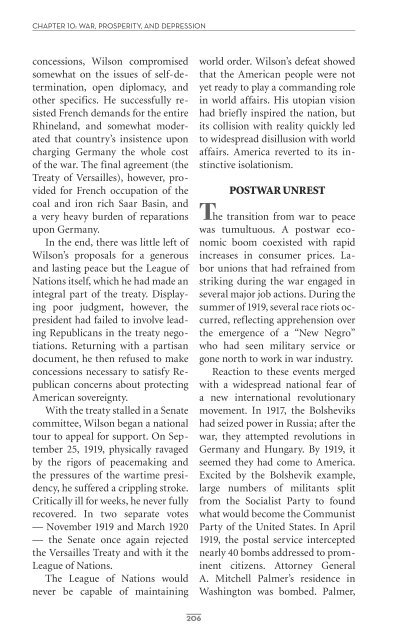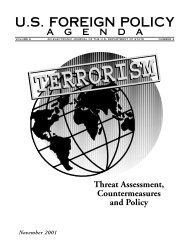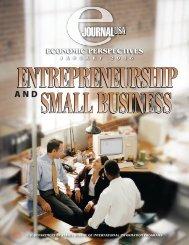s. history us history us history - Embassy of the United States
s. history us history us history - Embassy of the United States
s. history us history us history - Embassy of the United States
- No tags were found...
Create successful ePaper yourself
Turn your PDF publications into a flip-book with our unique Google optimized e-Paper software.
CHAPTER 10: WAR, PROSPERITY, AND DEPRESSIONOUTLINE OF U.S. HISTORYconcessions, Wilson compromisedsomewhat on <strong>the</strong> issues <strong>of</strong> self-determination,open diplomacy, ando<strong>the</strong>r specifics. He successfully resistedFrench demands for <strong>the</strong> entireRhineland, and somewhat moderatedthat country’s insistence uponcharging Germany <strong>the</strong> whole cost<strong>of</strong> <strong>the</strong> war. The final agreement (<strong>the</strong>Treaty <strong>of</strong> Versailles), however, providedfor French occupation <strong>of</strong> <strong>the</strong>coal and iron rich Saar Basin, anda very heavy burden <strong>of</strong> reparationsupon Germany.In <strong>the</strong> end, <strong>the</strong>re was little left <strong>of</strong>Wilson’s proposals for a genero<strong>us</strong>and lasting peace but <strong>the</strong> League <strong>of</strong>Nations itself, which he had made anintegral part <strong>of</strong> <strong>the</strong> treaty. Displayingpoor judgment, however, <strong>the</strong>president had failed to involve leadingRepublicans in <strong>the</strong> treaty negotiations.Returning with a partisandocument, he <strong>the</strong>n ref<strong>us</strong>ed to makeconcessions necessary to satisfy Republicanconcerns about protectingAmerican sovereignty.With <strong>the</strong> treaty stalled in a Senatecommittee, Wilson began a nationaltour to appeal for support. On September25, 1919, physically ravagedby <strong>the</strong> rigors <strong>of</strong> peacemaking and<strong>the</strong> pressures <strong>of</strong> <strong>the</strong> wartime presidency,he suffered a crippling stroke.Critically ill for weeks, he never fullyrecovered. In two separate votes— November 1919 and March 1920— <strong>the</strong> Senate once again rejected<strong>the</strong> Versailles Treaty and with it <strong>the</strong>League <strong>of</strong> Nations.The League <strong>of</strong> Nations wouldnever be capable <strong>of</strong> maintainingworld order. Wilson’s defeat showedthat <strong>the</strong> American people were notyet ready to play a commanding rolein world affairs. His utopian visionhad briefly inspired <strong>the</strong> nation, butits collision with reality quickly ledto widespread disill<strong>us</strong>ion with worldaffairs. America reverted to its instinctiveisolationism.POSTWAR UNRESTThe transition from war to peacewas tumultuo<strong>us</strong>. A postwar economicboom coexisted with rapidincreases in consumer prices. Laborunions that had refrained fromstriking during <strong>the</strong> war engaged inseveral major job actions. During <strong>the</strong>summer <strong>of</strong> 1919, several race riots occurred,reflecting apprehension over<strong>the</strong> emergence <strong>of</strong> a “New Negro”who had seen military service orgone north to work in war ind<strong>us</strong>try.Reaction to <strong>the</strong>se events mergedwith a widespread national fear <strong>of</strong>a new international revolutionarymovement. In 1917, <strong>the</strong> Bolshevikshad seized power in R<strong>us</strong>sia; after <strong>the</strong>war, <strong>the</strong>y attempted revolutions inGermany and Hungary. By 1919, itseemed <strong>the</strong>y had come to America.Excited by <strong>the</strong> Bolshevik example,large numbers <strong>of</strong> militants splitfrom <strong>the</strong> Socialist Party to foundwhat would become <strong>the</strong> CommunistParty <strong>of</strong> <strong>the</strong> <strong>United</strong> <strong>States</strong>. In April1919, <strong>the</strong> postal service interceptednearly 40 bombs addressed to prominentcitizens. Attorney GeneralA. Mitchell Palmer’s residence inWashington was bombed. Palmer,in turn, authorized federal roundups<strong>of</strong> radicals and deported many whowere not citizens. Strikes were <strong>of</strong>tenblamed on radicals and depicted as<strong>the</strong> opening shots <strong>of</strong> a revolution.Palmer’s dire warnings fueled a“Red Scare” that subsided by mid-1920. Even a murdero<strong>us</strong> bombingin Wall Street in September failed toreawaken it. From 1919 on, however,a current <strong>of</strong> militant hostility towardrevolutionary communism wouldsimmer not far beneath <strong>the</strong> surface<strong>of</strong> American life.THE BOOMING 1920SWilson, distracted by <strong>the</strong> war,<strong>the</strong>n laid low by his stroke, hadmishandled almost every postwarissue. The booming economy beganto collapse in mid-1920. The Republicancandidates for president andvice president, Warren G. Hardingand Calvin Coolidge, easily defeated<strong>the</strong>ir Democratic opponents, JamesM. Cox and Franklin D. Roosevelt.Following ratification <strong>of</strong> <strong>the</strong> 19thAmendment to <strong>the</strong> Constitution,women voted in a presidential electionfor <strong>the</strong> first time.The first two years <strong>of</strong> Harding’sadministration saw a continuance<strong>of</strong> <strong>the</strong> economic recession that hadbegun under Wilson. By 1923, however,prosperity was back. For <strong>the</strong>next six years <strong>the</strong> country enjoyed<strong>the</strong> strongest economy in its <strong>history</strong>,at least in urban areas. Governmentaleconomic policy during <strong>the</strong> 1920swas eminently conservative. It wasbased upon <strong>the</strong> belief that if governmentfostered private b<strong>us</strong>iness, benefitswould radiate out to most <strong>of</strong> <strong>the</strong>rest <strong>of</strong> <strong>the</strong> population.Accordingly, <strong>the</strong> Republicanstried to create <strong>the</strong> most favorableconditions for U.S. ind<strong>us</strong>try. TheFordney-McCumber Tariff <strong>of</strong> 1922and <strong>the</strong> Hawley-Smoot Tariff <strong>of</strong>1930 brought American trade barriersto new heights, guaranteeingU.S. manufacturers in one fieldafter ano<strong>the</strong>r a monopoly <strong>of</strong> <strong>the</strong>domestic market, but blocking ahealthy trade with Europe thatwould have reinvigorated <strong>the</strong> internationaleconomy. Occurring at <strong>the</strong>beginning <strong>of</strong> <strong>the</strong> Great Depression,Hawley-Smoot triggered retaliationfrom o<strong>the</strong>r manufacturing nationsand contributed greatly to a collapsingcycle <strong>of</strong> world trade that intensifiedworld economic misery.The federal government also starteda program <strong>of</strong> tax cuts, reflectingTreasury Secretary Andrew Mellon’sbelief that high taxes on individualincomes and corporations discouragedinvestment in new ind<strong>us</strong>trialenterprises. Congress, in laws passedbetween 1921 and 1929, respondedfavorably to his proposals.“The chief b<strong>us</strong>iness <strong>of</strong> <strong>the</strong> Americanpeople is b<strong>us</strong>iness,” declaredCalvin Coolidge, <strong>the</strong> Vermont-bornvice president who succeeded to <strong>the</strong>presidency in 1923 after Harding’sdeath, and was elected in his ownright in 1924. Coolidge hewed to<strong>the</strong> conservative economic policies<strong>of</strong> <strong>the</strong> Republican Party, but he wasa much abler administrator than <strong>the</strong>hapless Harding, whose administra-206207












